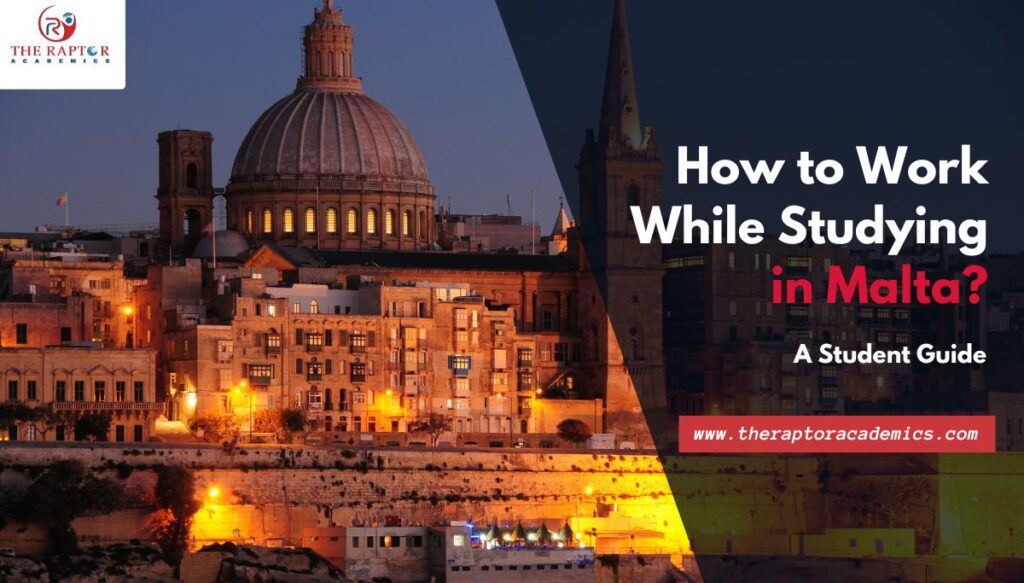Introduction
Studying abroad is a life-changing experience that offers immense educational and personal growth opportunities. However, many international students face the challenge of financing their education and living expenses. This is where working while studying can make a significant difference. Malta, a picturesque Mediterranean island, has emerged as one of the top study destinations for international students, not just for its quality of education but also for its part-time work opportunities.
Working while studying offers several benefits, including financial support, valuable work experience, and opportunities for networking within local industries. For students, it’s a chance to gain practical skills that complement their academic learning, which is essential when entering the global job market after graduation.
This article will serve as a comprehensive guide for students are looking to balance work while studying in Malta. From the types of jobs available and visa regulations to tips on how to manage both work and studies effectively, we will cover everything you need to know to make the most of your student experience in Malta.
Why Malta is a Great Place to Work While Studying
Affordable Cost of Living: Compared to other European study destinations like the UK, US, and Australia, Malta offers a more affordable cost of living. The expenses for accommodation, food, and transportation are much lower, allowing students to experience Europe without straining their budgets.
Growing Job Market: Malta’s job market is expanding rapidly, particularly in sectors like hospitality, retail, IT, and gaming. These industries provide ample part-time job opportunities, allowing students to gain valuable work experience while studying.
Student-Friendly Environment: Malta is known for being a student-friendly destination. Universities and the government actively support international students by offering clear visa guidelines and part-time job opportunities. This makes balancing work and study easier, ensuring a rewarding experience in Malta.
Suggested Read: How Much Does It Cost to Study in Malta? Find Out Now (2025)
Student Visa Requirements for Working in Malta
To study in Malta, non-EU students need to apply for a student visa. The process involves submitting proof of acceptance into a recognized institution, financial stability (to show you can cover tuition and living expenses), and a valid passport. Students must also provide health insurance coverage for the duration of their stay.
Under Malta’s work permit conditions, international students can work 20 hours per week during the academic semester and full-time during holidays. This allows students to support themselves financially while gaining valuable work experience.
Documents required for students to work include:
- Proof of university enrollment
- Financial documents showing sufficient funds
- Health insurance
- Valid passport
- Proof of accommodation
Types of Jobs You Can Do While Studying in Malta
Malta offers a wide range of part-time job opportunities for students, particularly in hospitality and tourism. With its thriving tourism industry, students can find work in hotels, restaurants, cafes, and bars, where they can practice language skills and customer service.
Retail jobs are also abundant. Students can work in shopping malls, stores, or supermarkets, assisting with sales, inventory, and customer support.
For those studying in IT, finance, or business, there are internships and part-time positions that offer professional experience. These positions help students build industry networks and gain practical knowledge related to their field of study.
Additionally, students in creative fields, such as design, writing, or programming, can explore freelancing and remote work. Websites like Upwork or Fiverr offer opportunities for students to work on projects remotely, giving them the flexibility to balance work and study.
How to Find Work in Malta
Finding a job in Malta is relatively straightforward. Popular job search websites like Jobsinmalta.com, MaltaPark, and LinkedIn are great resources for students seeking part-time positions.
Most universities in Malta offer career services, including job fairs and student networks, which can help students find work. Career counselors assist with resume building, interview preparation, and connecting with potential employers.
Networking is key—students should make use of university events, industry meetups, and online platforms like LinkedIn to connect with professionals and learn about job openings.
Finally, English proficiency is essential in Malta’s job market. As English is widely spoken, students with strong communication skills have an advantage when applying for roles in customer service, hospitality, and professional sectors.
Also Read: Top 10 European English-speaking countries [Updated 2025]
Balancing Work and Study: Tips for Success
Time Management:
Create a weekly schedule that includes dedicated time for studying, work, and personal activities. Use tools like calendars to track deadlines and shifts.
Setting Priorities:
Study commitments should always come first. Focus on assignments and exams, especially during critical periods. Plan work hours around study time to avoid conflicts.
Workload Limitations:
Student visas allow a maximum of 20 working hours per week. Keep track of your hours to avoid exceeding this limit and ensure academic success.
Stress Management:
To manage stress, take breaks, get enough sleep, and stay active. Use techniques like deep breathing or meditation to relax when feeling overwhelmed.
Pay and Work Conditions for Students in Malta
Hourly Wage:
The average hourly wage for part-time jobs in Malta is around €6 to €8 for roles in hospitality, retail, and other entry-level jobs. More specialized roles, such as internships or positions in IT, can offer higher pay rates depending on experience and qualifications.
Minimum Wage and Rights:
Malta has a minimum wage law, ensuring that all workers, including students, receive fair compensation. As of 2022, the minimum wage for full-time workers is approximately €800 per month. Student workers are entitled to the same rights as other employees, including fair treatment, paid leave, and safe working conditions.
Tax Regulations:
Students working part-time in Malta are required to declare their earnings if they exceed a certain threshold. If students earn more than €12,000 per year, they must file a tax return. However, part-time students typically earn below this amount, so they may not be subject to significant tax obligations but should still keep track of their income for clarity.
Post-Graduation Work Opportunities
Post-Study Work Visa: After graduation, international students in Malta can apply for a Post-Study Work Visa to stay and work for up to one year. To apply, students must secure a job and meet salary requirements.
Job Market After Graduation: Malta’s job market is thriving, particularly in IT, gaming, finance, and tourism. Graduates in these fields have excellent prospects for well-paying positions, with many companies actively seeking skilled workers.
EU-wide Opportunities: Studying in Malta gives graduates access to the Schengen Area, providing opportunities to explore job markets across 26 European countries. This opens up broader career prospects beyond Malta, offering students a chance to work across Europe.
Challenges and How to Overcome Them
Balancing Work and Studies:
One of the main challenges students face is managing time effectively between work and studies. To overcome this, students should create a clear schedule that prioritizes academic commitments, ensuring that work doesn’t interfere with exams or assignments.
Cultural and Language Barriers:
While English is widely spoken, adapting to the Maltese work culture may require some effort. To overcome language and cultural barriers, students can attend language classes or engage in social activities to become more familiar with the local culture and communication styles.
Limited Working Hours:
With the restriction of working 20 hours per week, students may find it challenging to earn enough. To maximize income, they can seek higher-paying jobs or work full-time during holidays, making the most of the available time.
Conclusion
Working while studying in Malta offers a unique opportunity to gain valuable work experience, support your finances, and immerse yourself in the European lifestyle. With part-time work options in various sectors like hospitality, IT, and retail, students can strike a balance between academics and earning. Malta’s student-friendly environment, coupled with the ability to work during holidays and after graduation, makes it an ideal study destination.
Explore the possibilities and maximize your experience in Malta. If you’re considering studying abroad, The Raptor Academics can help guide you through the process, providing expert advice and support to make your study and work experience in Malta seamless and successful. Contact us today to start your journey!
FAQs
How many hours can I work while studying in Malta?
Students on a student visa can work up to 20 hours per week during the academic semester and full-time during holidays.
What type of jobs can I do in Malta as an international student?
Common part-time jobs include positions in hospitality, retail, IT, finance, and customer service. Students can also explore internships and freelancing in creative fields like writing, design, and programming.
Do I need a separate work permit to work while studying in Malta?
No, your student visa allows you to work part-time during your studies. However, you must comply with the working hour limit and other visa conditions.
Can I work full-time in Malta during the holidays?
Yes, students are allowed to work full-time during university holidays and breaks.
How much can I expect to earn while working in Malta?
Hourly wages typically range from €6 to €8 for part-time jobs, with higher rates for specialized positions.
Can I stay in Malta after graduation to work?
Yes, students can apply for a Post-Study Work Visa after graduation to stay and work in Malta for up to one year.




